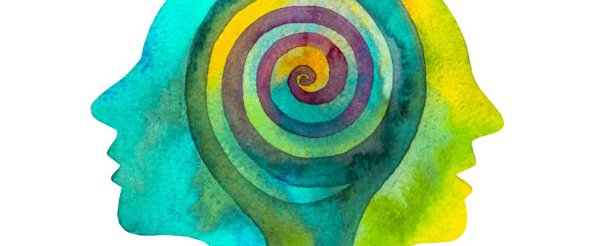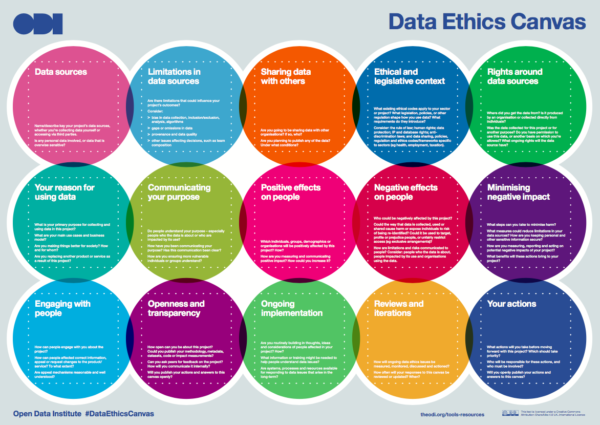
Find out about how members of ODI network are considering the complex world of data ethics, and how they are using ODI tools to navigate this landscape
We recently conducted a survey with members of the ODI network as part of our ongoing data ethics work. We found that a large majority – over 90% of the 613 respondents – thought it was important to be trustworthy (in the eyes of clients or customers for example) with how they use data.
Data ethics is a branch of ethics that evaluates data practices with the potential to adversely impact on people and society – in data collection, sharing and use
The results also showed that 88% of respondents thought the organisation they work for cares about how trustworthy they are with data, and over 93% believed they apply ethics to their work, and when working with data. However, only 54% believed that their organisation understands data ethics, with 35% saying they are unsure.
This indicated that, while respondents are aware of the importance of being trustworthy with data and are interested in learning more, there is a gap between this awareness, and having a comprehensive understanding of data ethics.
The data ethics landscape
Data ethics is a branch of ethics that evaluates data practices with the potential to adversely impact people and society – in data collection, sharing and use.
In many ways, the term ‘data ethics’ captures the zeitgeist of the post-Cambridge Analytica/Facebook era – which crystallised the issues of misuse of personal data, data rights and ethics. Data ethics is moving from the theoretical to the practical, with many organisations seeking to learn and apply practical data ethics skills to ensure that, over and above complying with data protection regulation, their organisation is trustworthy with data, and is perceived as such.
For example, an artificial intelligence system trained on data might make decisions about whether someone is eligible for a mortgage, or what insurance they can be offered. If the data itself is biased, that will affect the decisions made, which in turn impacts on people’s lives. And decisions about what data to collect – and what to exclude – might affect groups in a society. Therefore, data ethics should be considered at all stages of a project’s life cycle, from inception to completion.
The ODI created the Data Ethics Canvas to provide practical help in building ethical data considerations into business policies and processes. It is now our starting point for exploring data ethics with our clients and partners. It has evolved over the past three years to take in more aspects of data use.
It asks questions such as ‘How are you measuring, reporting and acting on potential negative impacts of your project?’ and ‘Are you routinely building in thoughts, ideas and considerations of people affected in your project?’. It helps identify and manage ethical issues – at the start of a project that uses data, and throughout. It encourages multidisciplinary teams to debate those issues and come to decisions.

Putting interest into action
The issue that businesses currently face is how to move from the theory of data ethics to real-world practice. It can be thought of along the same lines as how the Data Protection Impact Assessment (DPIA) helps operationalise personal-data-related risk management. The Information Commissioner’s Office describes the DPIA as ‘a process to help you identify and minimise the data protection risks of a project’ and it is now mandated by data protection regulation for any processing of personal data which could result in high risks to individuals. It is just one of the tools and processes available currently. While it would be difficult to mandate data ethics in the same way, the process of using tools to help operationalise a topic is similar.
Businesses may well feel that the General Data Protection Regulation (GDPR) and the DPIA already compel them to act in an ethical manner, but the Data Ethics Canvas allows them to think about ethical issues more broadly. It provides a checklist for businesses to work through during projects, in both the planning and implementation phases.
The Data Ethics Canvas allows teams to think holistically about a project’s progress and can highlight useful changes to make in ways of working, such as routinely asking peers for feedback on the project. It therefore can provide concrete and tangible methods of enabling ethical practice for the business as a whole.
Co-op has been using the Data Ethics Canvas within its digital delivery teams for a while, and has said that it helps ensure that “...everyone keeps data ethics in mind all the time”. It helps the project teams at Co-op make sure that they are acting as ethically as possible, at each step of the project.
The Data Ethics Canvas was created to provide practical help with projects that deal with all kinds of data, not just personal data. It is possible to do harm to people and groups even without collecting or using personal data, as evidenced by data-powered soap dispensers and hand-dryers in public bathrooms not working for certain skin tones.
Data ethics is a broad and complex landscape, and the Data Ethics Canvas provides a place to sense check data projects in terms of ethics, and to start conversations around ethics within organisations. Data and those working with data hold significant power, and therefore responsibility to mitigate any negative impacts, and to enhance positive impacts.
The Data Ethics Canvas helps provide people who work with data the space to think about the ethical issues. It works as a conversation starter to kickstart practical action in data ethics, which helps lead to a world where data works for everyone.
If you would like to share your views on data ethics, or your learnings from using the Data Ethics Canvas, or if your organisation wants help with data ethics, then please get in touch